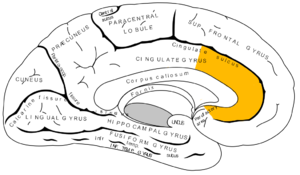We keep learning more each day that the brain is a social organ, very different from our original suppositions.
Remember, when we were kids in school and we chose up teams during recess. If you were the last person chosen, you felt (real) pain. Well, Dr. Eisenberger  and her colleagues at UCLA have tried a grown up version of those sort of games, using avatars. The results demonstrated that when one’s avatar were suddenly excluded from play, the subject felt snubbed, judged, or angry. And, since this was an experiment (and not on the ball field outside), the fMRI (functional magnetic resonance imaging) device connected to the subject indicated that their anterior cingulate cortex (the dorsal portion) was excited. That is the portion of the brain that is involved with discerning distress and pain (the “suffering region”)- and the results were not much different from that exhibited when physical pain was registered. It is thought that, since mammals need caregivers to grow and survive, our brain is shaped by social networks (the real ones, not the computer ones).
When we meet someone new, our brain makes (immediate) decisions as to whether they are friend or foe. We develop empathy and trust if they seem to belong to the same group as us (teams in sports, other side of town in communities, etc.). When we make that positive connection, our brains produce oxytocin, which is the hormone associated with maternal behaviors. (Oxytocin via nasal spray has also been shown to decrease our threat response.)
These points have relevance to business. As management theory has shown (and this goes way beyond MacGregor’s “Theory Y”, which relates positive results to when employees feel worthy and trusted), our business interactions are a bona-fide social network. And, when we feel betrayed or unsupported,  we feel the pain (just like we did when we were left standing in the school yard). While we may temper our reactions (because we are adults and because we need the pay), we cease being fully committed to that same social network that seemingly has abandoned us.
In addition, human social behavior means that when we develop teams and groups at work, we need to ensure that any perceived threat is, at best, minimal. We need to provide time to develop trust among other members.








Ernest Hemingway~ Theres absolutely nothing noble in being superior for your fellow men. Accurate nobility is becoming superior to your former self.
Bertrand Russell~ Guy requirements for his happiness not only the satisfaction of this or that but hope and enterprise and change.
When we are young, we are so much more open and receptive to these natural inclinations. As we age, our abilities to trust our basic instincts, are hindered by past experiences and the knowledge that human nature is based on a natural “survival of the fittest” and we limit our social network.
Nice to meet you, cpcharlie!
You are right about the young. We need to keep some of that spark alive as we grow and age- for creativity and happiness, both.
Roy